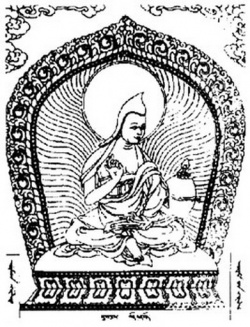Difference between revisions of "Gunaprabha"
| Line 3: | Line 3: | ||
Gunaprabha | Gunaprabha | ||
[徳光] (n.d.) (Skt; Jpn Tokuko) | [徳光] (n.d.) (Skt; Jpn Tokuko) | ||
| + | Gunaprabha (Skt. Guṇaprabha; Tib. ཡོན་ཏན་འོད་, Yönten Ö; Wyl. yon tan 'od) — an Indian master of the Vinaya tradition born in the seventh century and a disciple of Vasubandhu. According to one tradition, he is considered as one of the ‘Two Supreme Ones’—great commentators on the Buddha’s teachings. | ||
A [[Monk]] and scholar of [[India]]. His story appears in The Record of the Western Regions —Hsüan-tsang's account of his travels through Central Asia and [[India]] in the seventh century in which he wrote about the [[Religion]], customs, folklore, etc., of the areas he visited. Gunaprabha was said to have first studied the [[Mahayana]] teachings but converted to the Hinayana after reading a Hinayana treatise, and wrote scores of treatises in which he criticized the [[Mahayana]] teachings. He was believed to have ascended to the [[Tushita]] [[Heaven]] to resolve his remaining doubts concerning the differences between the Hinayana and the [[Mahayana]]; there he met [[Bodhisattva]] [[Maitreya]], but did not respect or learn from him because [[Maitreya]] was not an ordained [[Monk]]. | A [[Monk]] and scholar of [[India]]. His story appears in The Record of the Western Regions —Hsüan-tsang's account of his travels through Central Asia and [[India]] in the seventh century in which he wrote about the [[Religion]], customs, folklore, etc., of the areas he visited. Gunaprabha was said to have first studied the [[Mahayana]] teachings but converted to the Hinayana after reading a Hinayana treatise, and wrote scores of treatises in which he criticized the [[Mahayana]] teachings. He was believed to have ascended to the [[Tushita]] [[Heaven]] to resolve his remaining doubts concerning the differences between the Hinayana and the [[Mahayana]]; there he met [[Bodhisattva]] [[Maitreya]], but did not respect or learn from him because [[Maitreya]] was not an ordained [[Monk]]. | ||
Revision as of 03:54, 29 April 2013
Gunaprabha
[徳光] (n.d.) (Skt; Jpn Tokuko)
Gunaprabha (Skt. Guṇaprabha; Tib. ཡོན་ཏན་འོད་, Yönten Ö; Wyl. yon tan 'od) — an Indian master of the Vinaya tradition born in the seventh century and a disciple of Vasubandhu. According to one tradition, he is considered as one of the ‘Two Supreme Ones’—great commentators on the Buddha’s teachings.
A Monk and scholar of India. His story appears in The Record of the Western Regions —Hsüan-tsang's account of his travels through Central Asia and India in the seventh century in which he wrote about the Religion, customs, folklore, etc., of the areas he visited. Gunaprabha was said to have first studied the Mahayana teachings but converted to the Hinayana after reading a Hinayana treatise, and wrote scores of treatises in which he criticized the Mahayana teachings. He was believed to have ascended to the Tushita Heaven to resolve his remaining doubts concerning the differences between the Hinayana and the Mahayana; there he met Bodhisattva Maitreya, but did not respect or learn from him because Maitreya was not an ordained Monk.
